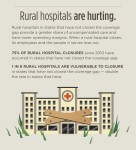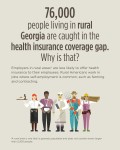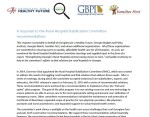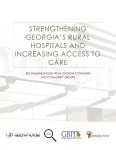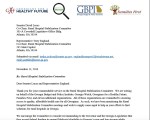- Home
- >
- Our Priorities
- >
- Increasing Access to Care
- >
- Rural Access
Rural Access
Rural Georgians experience health disparities on multiple dimensions: they are less likely to have job-based health insurance, may have to travel long distances to seek medical care, and experience higher rates of chronic health conditions than their suburban and urban counterparts.
Rural hospitals are often the cornerstones of rural communities, serving as both an economic engine and an access point for health care services, yet several rural hospitals have closed in recent years and more are at risk of closure.
To ensure that Georgians living in rural parts of the state have the access to care that they need, Georgians for a Healthy Future supports policy initiatives (such as closing the coverage gap) that can strengthen our rural health system and increase access to care.

Four of Georgia’s rural hospitals have closed in the last several years. Fifteen more are financially fragile according to the 2015 final report from Georgia’s own Rural Hospital Stabilization Committee. Increasing health coverage would provide Georgia’s hospitals with an increase source of revenue and a lower burden of uncompensated care. Closing Georgia’s coverage gap could keep hospital doors open in rural communities.
Since 2010, 9 rural hospitals have closed in Georgia. That puts Georgia third in the nation for hospital closures behind Tennessee and Texas. Rural hospitals in states with no Medicaid expansion are more likely too close, shutting off access to care for their communities.
When a hospital closes in a rural community, the effects ripple through every aspect of community life. The hospital’s doctors and nurses move to other communities. Residents are left without access to emergency care and other important health services. The businesses around the hospital may close—a local pharmacy, the downtown diner, or the florist. Jobs are lost and businesses become reluctant to move to the area because it lacks health care. Visit GHF's Georgia Can't Wait page to learn more about this project.
Related Resources (7 items) Go to Library

